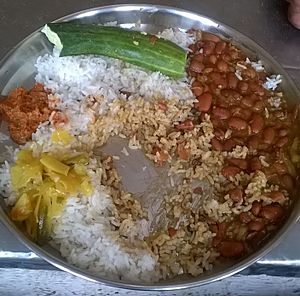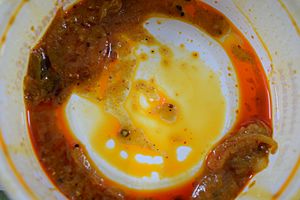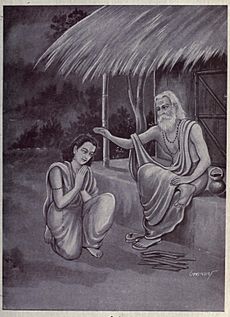Uchchhishta facts for kids
Uchchhishta (Sanskrit: उच्छिष्ट, Ucchiṣṭa) is an important idea in Indian and Hindu culture, especially about food. It doesn't have one exact English word, but it often means "leftovers" or "food scraps" that are considered impure.
Uchchhishta usually refers to food that has touched someone's mouth or saliva. It can also mean a person or a plate that has come into contact with such food. Both the food and the person or plate are seen as ritually impure. After eating, a person becomes pure again by washing their hands and mouth.
Generally, it's very disrespectful to offer Uchchhishta to someone. However, there are exceptions. For example, it can be acceptable to eat the Uchchhishta of people who are considered socially superior. Also, offering Uchchhishta food to Hindu gods is usually forbidden. But some special Tantric gods are worshipped with this type of offering.
Contents
What is Uchchhishta?
The word Uchchhishta has several meanings. Here are some of the main ones:
- Food or hands that have touched the inside of someone's mouth.
- Pollution from touching a person who has just eaten, the food they ate, or their plate.
- Food left on someone's plate after they finish eating.
- Food left in a serving dish after everyone has been served.
Uchchhishta is about contact with saliva. Saliva is seen as having an "uncertain status." This means it's part of the body but also not. Because of this, contact with saliva, especially in food, is often considered impure. However, not all saliva is seen as defiling. For example, tiny drops of saliva that fly out when people talk are not considered impure.
One reason for this concept might be to prevent the spread of germs. Sharing food that has touched someone's mouth could spread bacteria or viruses.
Some thinkers have questioned the idea of Uchchhishta. They ask why flowers offered to gods are not impure from bee saliva. Or why cow's milk is not impure from a calf's saliva.
Regional Names for Uchchhishta
The concept of Uchchhishta is known by different names across India:
- Jutha or Jhutha – in Hindi and Bengali
- Ushta – in Marathi. This term can also mean "used by others," like a copied speech.
- Enjalu – in Kannada, meaning "saliva."
- Engili – in Telugu
- Eccil – in Tamil
- Eccam – in Malayalam
- Aintha – in Odia
- Etho – in Bengali
- Made – in Tulu
Rules About Uchchhishta
In Hinduism, Uchchhishta is generally seen as very polluting and impure. People usually feel disgusted by it. Eating Uchchhishta is often considered humiliating. A saying in Kannada even compares someone who eats Uchchhishta to a dog. Offering Uchchhishta to someone of a higher social group is seen as an insult.
To avoid making food Uchchhishta, people follow certain rules:
- They usually don't dip their fingers or cutlery into a shared dish if those have touched their mouth.
- When cooking, a cook might taste food with a spoon, but then puts that spoon aside to be washed. They won't use it again to stir the food.
- When sharing dry foods or fruits, people portion them out. This way, the food doesn't get contaminated by someone's saliva.
- For the same reason, Hindus generally do not drink from each other's water glasses.
In the past, many traditional Hindus avoided using spoons, forks, or metal plates. This was because these items touched the mouth and were thought to remain Uchchhishta even after cleaning. Instead, they preferred one-use leaf plates. Hindus traditionally eat with their fingers, without cutlery.
Who Can Eat Uchchhishta?
While generally avoided, Uchchhishta can be eaten by people who are considered socially less important. This includes servants, people from lower social groups, beggars, and animals. Historically, some groups lived on leftovers. Eating someone's Uchchhishta can be a sign of respect or acceptance of that person's higher status.
In modern India, the rules about Uchchhishta are often more relaxed within families or between couples. For example, it's okay for parents to eat the Uchchhishta food of their young child. This is because a young child is not seen as a fully separate person. Parents often feed small children from their own plates.
Positive Uchchhishta
Despite the negative views, some types of Uchchhishta are highly respected. These include the Uchchhishta of a husband eaten by his wife, a teacher (guru) by a student, or food from a sacrifice or divine offering.
Prasad is food offered to a god and then "eaten" by the deity. In some parts of North India, Prasad is seen as the Uchchhishta of the gods. However, in parts of South India, comparing sacred Prasad to Uchchhishta is not liked.
A Hindu wife might eat her husband's Uchchhishta as a sign of love and devotion. She might eat from the same leaf plate after he finishes. He might leave some food for her as a symbol of his love. This custom is sometimes performed during weddings. It shows her becoming part of her new family. It's also acceptable for a wife to eat the Uchchhishta of her in-laws or her husband's brothers.
In ancient times, students lived with their teachers (gurus) to learn. Students were told not to leave any food on their plate, meaning no Uchchhishta. If any was left, they should bury it, throw it in water, or give it to someone from a lower social group. However, students were allowed to eat their guru's Uchchhishta. This was seen as sacred, like a special offering. Eating the Uchchhishta of one's father or brother was also acceptable. Some texts even said that a guru's Uchchhishta was like medicine for a sick student.
There are also exceptions to what is considered Uchchhishta. Food stuck in teeth or food currently in the mouth is not impure. They are seen as part of the mouth. Swallowing them cleanses the person. Also, if drops of water fall on someone's feet while they are drinking, those drops are not Uchchhishta. They are considered part of the ground.
The idea of Uchchhishta emphasizes cleaning hands and mouth after eating. This cleansing also extends to the kitchen. It ensures no trace of Uchchhishta or previous cooking is left.
Uchchhishta and Hindu Gods
Generally, offering Uchchhishta food to Hindu gods or worshipping while in an Uchchhishta state is forbidden in mainstream Hinduism. However, some special Tantric goddesses are exceptions.
The Tantric goddess Matangi is sometimes offered Uchchhishta food. Devotees might offer it while still having food in their mouth and unwashed hands. Matangi is linked with breaking social rules and is sometimes seen as an "outcaste" goddess. A story says she was born from Uchchhishta. The gods Shiva and Parvati, and Vishnu and Lakshmi, dropped food specks while eating. A divine maiden appeared from this Uchchhishta and asked for their leftovers. The gods blessed her and named her Uchchhishta-Matangini (Matangi).
Another Tantric god worshipped in an impure Uchchhishta state is Uchchhishta Ganapati. This is a special form of the elephant-headed god Ganesha. His name also comes from Uchchhishta.
While Matangi receives human Uchchhishta, the goddess Vimala receives divine Uchchhishta from the god Jagannath. Vimala is a special partner of Jagannath and protects his main temple in Puri. Vimala is said to live on Jagannath's Uchchhishta. Vegetarian food offered to Jagannath is then offered to Vimala. After this, it becomes sacred Mahaprasad. A story explains this: Once, Shiva ate a grain of Vishnu's Uchchhishta. Half of it got stuck in Shiva's beard, and the sage Narada ate it. Parvati was upset because her share was gone. Vishnu comforted her, saying that in the future, she would live as Vimala in Puri and eat his food remnants daily.
In later versions of the Hindu epic Ramayana, a forest woman named Shabari was told by her teacher to wait for the god Rama. Every day, she collected wild berries. She tasted them to make sure they were sweet, keeping only the good ones for Rama. This made the berries Uchchhishta without her knowing. When Rama finally visited her, Shabari offered him these Uchchhishta berries. Rama's brother, Lakshmana, thought the berries were impure and not fit for a god. But Rama accepted them. He saw that they were offered with great love and devotion, which was more important than their impurity.
 | James B. Knighten |
 | Azellia White |
 | Willa Brown |




